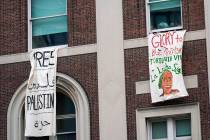LETTERS: Added fees could help Metro reconsider noninjury accident policy
To the editor:
I have a proposal that differs from the Metropolitan Police Department’s new policy to not investigate noninjury accidents on the surface streets of its jurisdiction, and mine could help generate funds.
Suppose a solo unit is dispatched to an accident scene, and an officer investigates. Upset drivers are calmed, statements are taken, assessments are made about relative damage, sobriety of the persons involved and the probable point of impact, and roadways are cleared.
Later, an insurance company requests a copy of the accident report — for a fee. If Metro needs further funds, an investigation fee can be attached to the requested report. The ticket to the driver responsible for the accident, the report fee and a possible investigation fee could add up to a nice little sum that more than pays for the 40 minutes of the officer’s time and effort.
Doing more with less has been a mantra of policing for years, but public safety trumps crying about budgets and personnel, and how that personnel should be used.
P.J. O’MALLEY
PAHRUMP
Animal cruelty
To the editor:
I read a brief regarding Dirk Arthur and his “Wild Magic” show at Harrah’s casinos in Reno and Laughlin (“Feds report two Harrah’s shows treating animals poorly,” March 7 Review-Journal). The U.S. Department of Agriculture cited the show in December and issued a formal warning in January about some egregious problems regarding the housing of big cats and declawing some of them, even though the USDA disallowed this inhumane practice 10 years ago.
This is not the first time Mr. Arthur has had animal problems. I think Harrah’s and parent Caesars Entertainment Corp. need to take a hard look at this and do the right thing, as many other hotels have done, and phase out animal acts. This is not entertainment, and many of us hope it ends now.
Rick Thomas, who performed successfully for years at the Tropicana hotel with his white tigers, recently retired them all to a sanctuary and said he now realizes they deserve a better life than being on stage. Hats off to Mr. Thomas, as he did the right thing for his animals. Let’s hope Harrah’s and Caesars do likewise with their wild animal acts.
LINDA FASO
LAS VEGAS
Ugly entertainment
To the editor:
I read the short article about the U.S. Department of Agriculture’s investigation into the treatment of animals used in Dirk Arthur’s magic show, and I was amazed that we still offer these acts in our casinos and hotels (“Feds report two Harrah’s shows treating animals poorly,” March 7 Review-Journal).
With the increasing knowledge of how animals used for entertainment must live their lives, I can’t believe that this form of entertainment hasn’t been phased out altogether.
I haven’t patronized a venue that profits from animals in years, yet I’ve found a plethora of other ways to seek entertainment, none of which involves cruelty to animals. I understand that this is not the first time that Mr. Arthur’s treatment of his animals has been questioned. That alone is a good indicator of how the animals are viewed by their owner; they’re commodities.
These sentient beings deserve to live their lives in a better environment, rather than on a stage part of the time, and stored somewhere else the rest of the time. Animals were never meant to perform, and I’m sure if they had a choice, they would rather leave that to the talented human entertainers who would much rather be on the stage.
We are living in a time of increased awareness and compassion. Let’s catch up.
ANNOULA WYLDERICH
LAS VEGAS
Youth mental health
To the editor:
Yesenia Amaro’s article on the lack of residential psychiatric care for children was most timely and enlightening (“Gap in state rule limits psychiatric care,” March 7 Review-Journal). When I served on the Clark County School Board years ago, teachers, counselors and nurses often complained about the lack of psychiatric facilities for children. A few years later, after my teenage son suffered from a serious mental illness, we had to send him to various institutions in California, where he died.
I became an advocate for the mentally ill, and then-Gov. Richard Bryan appointed me as chair of the Nevada Commission of Mental Health/Mental Retardation. In that position, I met Dr. Norton Roitman, a psychiatrist in charge of the Sparks mental hospital, who told me about the San Diego Center for Children, which has been very effective in dealing with children’s psychiatric problems.
I met with Carolyn Sparks, then a regent of the university system, who had also seen the need for treatment of children with mental problems. We visited the San Diego center, and the staff there lent its expertise to help set up the nonprofit Nevada Children’s Center in 1991, which has served thousands of children over the past 23 years.
Since there is no residential treatment facility in Nevada, many parents have told me that they had to send a child out of state. The cost was exorbitant, and for most parents, the cost of visiting their child and paying for airfare and hotels is prohibitive. A local residential facility would save parents and the state of Nevada millions of dollars.
It is my hope that Kyle Devine, chief of the state’s Bureau of Health Care Quality and Compliance, is successful in pursuing residential treatment centers for children, and that the Nevada Board of Health will approve it and the Legislature will pass the appropriate legislation in the next session.
HERMAN VAN BETTEN
BLUE DIAMOND
The writer is a member of the board of directors of the Nevada Children’s Center.























